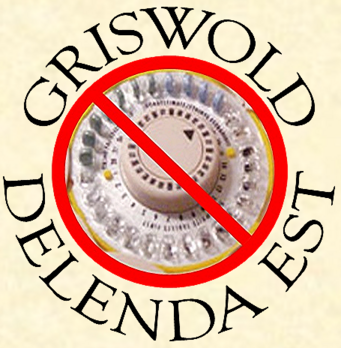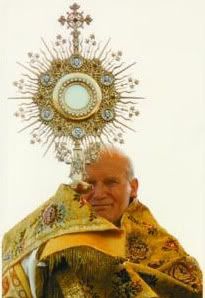On End-of-Life Decisions
As many of our readers probably remember, a large part of the Terri Schindler-Schiavo [requiescat in pace] controversy (in conversation and armchair punditry, though not in the legal/political battle) centered around whether she was being cared for by "extraordinary means." The Catechism of the Catholic Church says the following under the heading of Euthanasia (CCC 2276-2279) [note particularly the 4th paragraph]:
The most useful definition of extraordinary means that I've heard is any function that the body would normally perform involuntarily. Respirators, dialysis machines, machines that make the heart keep beating (I'm sure these have a specific name, but it escapes me), and the like are extraordinary. Feeding tubes would not be considered extraordinary, because the body does not ingest nutrients involuntarily. Therefore, one could licitly remove a person's respirator, but not his feeding tube.Those whose lives are diminished or weakened deserve special respect. Sick or handicapped persons should be helped to lead lives as normal as possible.
Whatever its motives and means, direct euthanasia consists in putting an end to the lives of handicapped, sick, or dying persons. It is morally unacceptable.
Thus an act or omission which, of itself or by intention, causes death in order to eliminate suffering constitutes a murder gravely contrary to the dignity of the human person and to the respect due to the living God, his Creator. The error of judgment into which one can fall in good faith does not change the nature of this murderous act, which must always be forbidden and excluded.
Discontinuing medical procedures that are burdensome, dangerous, extraordinary, or disproportionate to the expected outcome can be legitimate; it is the refusal of "over-zealous" treatment. Here one does not will to cause death; one's inability to impede it is merely accepted. The decisions should be made by the patient if he is competent and able or, if not, by those legally entitled to act for the patient, whose reasonable will and legitimate interests must always be respected.
Even if death is thought imminent, the ordinary care owed to a sick person cannot be legitimately interrupted. The use of painkillers to alleviate the sufferings of the dying, even at the risk of shortening their days, can be morally in conformity with human dignity if death is not willed as either an end or a means, but only foreseen and tolerated as inevitable. Palliative care is a special form of disinterested charity. As such it should be encouraged.
Of note on this topic is also the last bit of CCC 2280, from the section on Suicide: "We are stewards, not owners, of the life God has entrusted to us. It is not ours to dispose of."
I was under the erroneous impression, until Fr. Joe enlightened me yesterday, that the Church frowned on organ donation and other such post-mortem procedures. She does not. CCC 2301 says:
It should be obvious that the reason for donating one's body for research or one's organs to living persons should be altruistic (note "the free gift" in the above). Sam shouldn't sell his Great Aunt Trudy to the local medical school so he can go buy a new TV. Fr. Joe also pointed out in our class that once the research community has finished using the body (at UT Med in Memphis, this is 3 months after the person's death), it should be given a proper burial.Autopsies can be morally permitted for legal inquests or scientific research. The free gift of organs after death is legitimate and can be meritorious.
The Church permits cremation, provided that it des not demonstrate a denial of faith in the resurrection of the body.
The old prohibition against cremation stemmed from the practice by those who wished to persecute the faithful of cremating the bodies of Christians as a way of sticking it to that wacky "resurrection" idea. Hence, we have a caveat in the allowance of cremation that forbids choosing cremation as a means of rebellion against Church teaching. The Code of Canon Law says, "The Church earnestly recommends that the pious custom of burying the bodies of the deceased be observed; nevertheless, the Church does not prohibit cremation unless it was chosen for reasons contrary to Christian doctrine" (Can. 1176 §3). Fr. Joe told us that cremation should really only be chosen when there is a clear reason for it, giving the example of an area with very limited space for the cemetery. He also said that it was not until the mid-1990s that cremains were allowed to be brought into churches for funeral masses, which I found interesting.
Of course, in thinking about cremation, one must remember that cremains are not to be "scattered" (except in the case of deceased members of the Navy, whose ashes may licitly be buried at sea). The cremains should be treated with the same degree of respect as a non-cremated body.
We are required to treat human bodies with honor and reverence because they serve a holy function. As St. Paul wrote to the Corinthians, "Do you not know that your body is a temple of the Holy Spirit within you, whom you have from God, and that you are not your own? For you have been purchased at a price. Therefore glorify God in your body" (1 Cor. 6:19-20).
File Under: Doctrine








2 Comments:
This was very helpful. Thank you for writing this.
Thank you for this post.
Please consider informing your readers of this resource
(Serious Health Care and End of Life Decisions) at: http://healthcaredecisions.blogspot.com/
Thank you for your pro-life efforts.
Respectfully,
Fredi D'Alessio
Post a Comment
<< Home